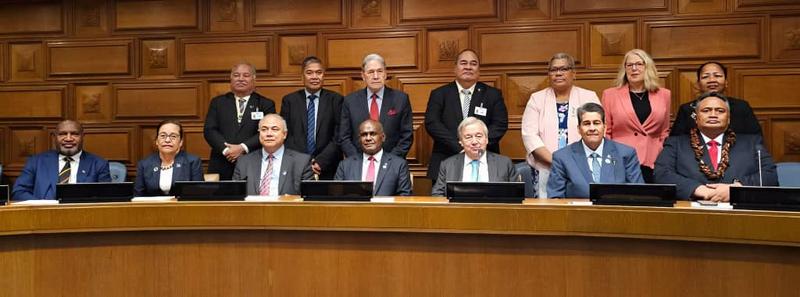Papua New Guinea Prime Minister James Marape delivered the country’s statement at the United Nations General Assembly (UNGA) 80th Session General Debate in New York, aligning his address with PNG’s 50th independence anniversary and 50 years of UN membership.
He opened by highlighting the enduring strength of PNG’s Constitution, which he described as the nation’s binding force across extraordinary diversity.
“Papua New Guinea is extraordinarily diverse — over 1,000 tribes, 850 languages and 600 islands. Yet our Constitution binds us as one people, one nation, one country,” Marape said.
From there, he paid tribute to churches for their role in delivering education, health and community services, while stressing the constitutional protection of all faiths. “Religion must never divide humanity — coexistence must,” the Prime Minister affirmed.
Turning to PNG’s history of conflict, Marape recalled the decade-long Bougainville crisis and its peaceful resolution under UN guidance.
“For a decade, Bougainville suffered violence, but through dialogue under UN oversight we achieved the 2001 Bougainville Peace Agreement. Not a bullet has been fired since,” he said, noting Bougainville as a powerful example of peace built on genuine will.
Visit of the UN Secretary-General
Marape then reflected on the recent visit of UN Secretary-General António Guterres to Papua New Guinea, his first official visit to the country. He said Guterres commended PNG’s leadership on climate action, cultural diversity and its peace model in Bougainville.
At the same time, he acknowledged the Secretary-General’s call for improvement.
“He also reminded us to fight corruption, strengthen governance and ensure services reach all citizens. At 50 years, we recommit to transformation so that no citizen is left behind,” he said.

Global Responsibility: Forests, Oceans and Climate
Shifting to global challenges, Marape underlined Papua New Guinea’s role as a forest and ocean nation with unique responsibilities.
“Our tropical forests absorb carbon and produce oxygen. Our vast Pacific waters are part of the world’s greatest carbon sink. Our reefs, rivers and ecosystems shelter unique biodiversity,” he told the Assembly.
Reaffirming PNG’s commitment ahead of COP30 in Brazil, he added, “There is no other planet like Earth. Our ancestors left us a liveable planet; we must do the same for our descendants.”
Marape also urged the G20 and industrial nations to act with greater urgency. “We call especially on G20 and industrial nations to cut emissions, reform global finance to support biodiversity nations and align responsibility with carbon footprint. Our forests and oceans are not just Papua New Guinea’s — they are global goods,” he declared.
Marking PNG’s Golden Anniversary
In closing, the Prime Minister used PNG’s golden anniversary to express appreciation to international partners. “On this 50th anniversary, I thank the United Nations for embracing us since 1975, our bilateral and multilateral partners, Australia for peacefully granting independence and investors, NGOs and churches for their enduring service,” he said.
He ended by linking Papua New Guinea’s journey with the UN’s wider role as a meeting ground for humanity. “Fifty years ago, we entered this Assembly as one of its youngest members. Today, we stand as a free and democratic nation, with unity in diversity, resilience and vast natural endowments,” he said.
Congratulating the UN on its 80th anniversary, Marape concluded with a message to the world: “Unity can be found in diversity. Peace is built and sustained through dialogue. This one planet must be preserved for all generations.”










